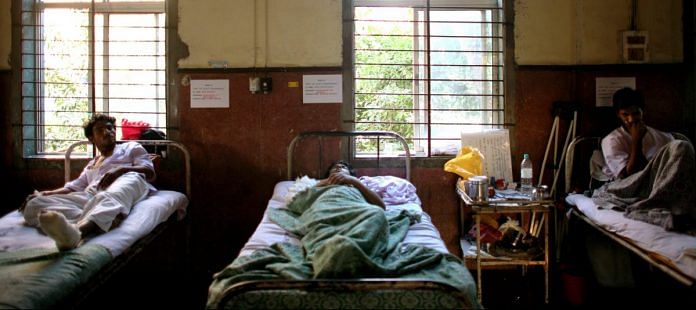Dr Randeep Guleria says the government must step in to check overcharging by private hospitals.
Dr Randeep Guleria, director of All India Institute of Medical Sciences, calls for public-private partnership to provide affordable healthcare in the wake of allegations of overcharging corporate hospitals. In an interview with Special Correspondent Rahiba R. Parveen, he suggests that the government must step in to monitor these hospitals. Excerpts:
What is your view on cases of overcharging and negligence involving some well-known private hospitals?
Affordable healthcare needs to be provided to everyone irrespective of their socio-economic status. To do so, we have to develop a mechanism. The government has to spend more and build adequate infrastructure. It has to look at public-private partnership and needs to ensure that private partners can provide affordable healthcare.
Currently, there is no mechanism for price control and therefore, there is no limit up to which corporate hospitals can charge. That’s why many patients feel they are being overcharged. We need to balance that out by allowing corporate hospitals to earn profit since they have invested money and at the same time, maintain affordability in healthcare.
We have a huge number of patients who are really needy but cannot afford healthcare. Unless we have a healthy population, we will not grow as a healthy nation. Therefore, we have to develop a policy of affordable universal healthcare for all our citizens, irrespective of their socio-economic status.
Where do we stand in term of affordability?
The situation seems to have gone from bad to worse. We have moved from small, affordable clinics and nursing homes to large corporate hospitals. So, the cost of healthcare has gone up tremendously.
Also, investigative medicine has been given priority over clinical medicine. Now, you get more and more tests done which have added to the cost of healthcare. So, we need to find a balance between the two aspects and bring back our focus on clinical medicine.
So, the question is: do we really need these huge five-star hospitals that have come up of late since a majority of patients cannot afford treatment there?
Do you feel that public-private partnership is the ultimate solution?
Ultimately, the need is so much that it will be difficult for the government to bear the entire burden. The private sector can support the government in a judicious and affordable manner.
Emergency OPD and ward services should be guided by ethics. However, at present, corporate hospitals are under pressure to maximise their returns.
We should keep this mind that medicine is not about profit; it is a service. It is linked to the social sector, not the business sector.
At present, how can we monitor these hospitals?
Government must step in. That’s why I said a public-private partnership is the need of the hour. Some sort of legislation and system is needed to balance it out.
We can see long queues at AIIMS? What are you doing to tackle the rush?
We are trying our best. We are expanding and growing. We are building new blocks to manage the patient load. But if you look at the bigger picture, you will need to develop a mechanism whereby we can create more AIIMS like institutes or a public-private partnership so that the load of patients can be shared with other hospitals without compromising on the quality.
People should get the same quality of care that AIIMS-Delhi is providing and which is also affordable. We can’t have everything focused on one place; we need to develop other areas of excellence.
AIIMS has opened its campuses in different states. But are they up to the mark?
I feel that it will take some time for them to mature because any institute needs 5-10 years to grow. We at AIIMS-Delhi are very keen to support and mentor them so that each of them becomes a regional AIIMS and we can share the load with them.
Where do we stand with respect to disease threats?
Our average lifespan has increased dramatically. There is a change in diseases we have seen. Tuberculosis continues but it has seen a downward trend. A lot of infectious diseases, diarrhoea, malaria and leishmaniasis have all come down. We have no polio at present and small pox has been eradicated as well.
We can see a paradigm shift from infectious diseases to non-infectious and non-communicable diseases. There has to be a policy to manage the burden of lifestyle diseases such as of diabetes and hypertension.
Initially, we did not have this problem because our average lifespan was low. Now, it’s more than 70 years. So, we need to have a policy to deal with age-related problems like osteoarthritis, knee replacement surgery, heart problem and different types of cancers.
There is a big need to develop healthcare programmes, which are sustainable.
How far are we ready to provide treatment for cancers?
We are always catching up. At the same time, we need to do more. AIIMS itself is building a 700-bed National Cancer Institute in Jhajjar, Haryana. It will open this year.
The whole focus is on cancer management, research and providing quality care to patients. But this is not enough; we will need more and more such facilities given the huge burden. We are working in that direction.
But I think we have to work faster because the number of patients is increasing in a big way.




Better salary better infrastructure job strictly on merit free from bearucratic interference and corruption.
Dr Puneet Chandna: Dr Guleria is absolutely right in his opinion and his ability to turn around many such centres in India and that India has the capability. Very few like him as i have closely watched in my practice including his brother and father have given a selfless service as a Clinician Expert, Reader and administrator. We wish him all thievery best from the medical fraternity.